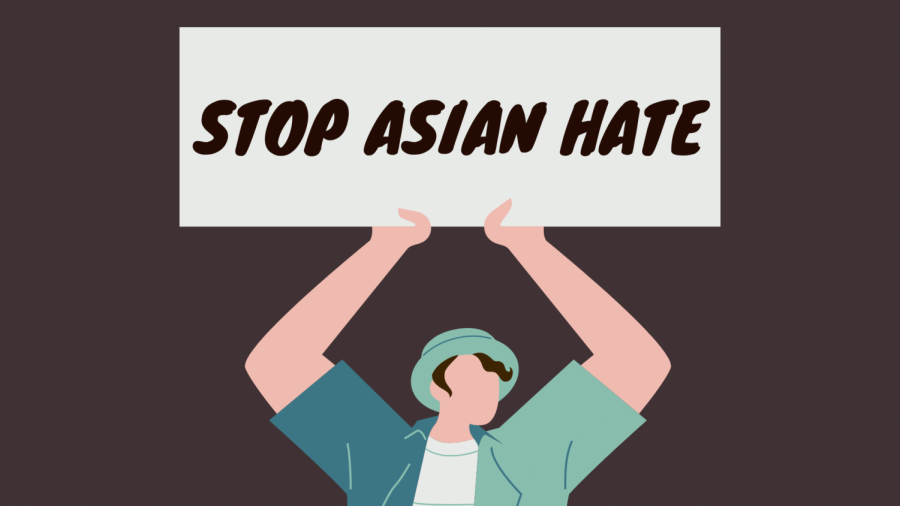Students React to Atlanta Spa Shootings and Share Experiences With Anti-Asian Racism
Protests unfolded across the country in response to the Atlanta spa shootings, with many Americans demanding justice for the victims.
March 31, 2021
On March 16, a white gunman opened fire on three massage parlors in and around Atlanta, Georgia, killing eight people in total, seven of whom were women and six of whom were of Asian descent.
In the weeks after, gatherings of people bearing flowers and signs lined the scenes of the shootings, national protests filled the streets, and a mix of feelings and experiences emerged within the La Salle community.
The motive of the murders is still under investigation, but the Atlanta spa shootings transpired against the backdrop of a recent surge in reports of violence against Asian Americans during the coronavirus pandemic, and followed a long history of cultural and systemic racism toward people of Asian descent in the U.S.
“I feel like the racism that has happened was driven purely out of disrespect and ignorance toward the Asian community,” junior Amanda Rivera said.
Attacks targeting Asian Americans have increased nearly 150 percent in the past year, with many victims being female or elderly. In addition, 58 percent of Asian Americans believe that racist views toward them have increased during the pandemic, according to the Pew Research Center.
Like others in the U.S., La Salle students have observed and been impacted by anti-Asian racism during the COVID-19 pandemic. In the aftermath of the Atlanta spa shootings, several students shared their thoughts and experiences surrounding racism toward Asian Americans, with some calling for more open discussion within the La Salle community.
“There’s definitely a lot of hurt going on right now,” senior Alex Fiedler said. “And I think there’s necessary conversations that need to happen about the root of this kind of prejudice… and what we can do to prevent it from taking place again in the future.”
For some Asian American or Pacific Islander students, the Atlanta spa shootings and other recent attacks have kindled feelings of concern for those in their community, especially the elderly.
“I feel worried,” senior Elvan Ngo said. “I know my grandparents, they usually have morning walks, but now we’re telling them not to go outside, [and that] we’ll go get groceries for you.”
Similarly, Rivera said, “I make sure to check on my grandparents every day.”
As well as sparking fear for loved ones, the rise in anti-Asian racism has made some students nervous about being targeted themselves.
“I am definitely more cautious in the way I act when I am in public,” Rivera said. “Like many, I wear my mask and I make sure it’s thick enough too, but I do it so people can be safe and also so I don’t get called out for spreading anything just because I’m Asian.”
Sophomore Raphael De Leon said that “for the AAPI community, we need to be a lot more careful about where we go… because this could happen to us, just because we’re Asian.”
Although recent attacks against Asian Americans have been troubling to many students, some said that these incidents of violence have not been entirely unexpected.
Given that “a lot of people still blame Asians for the coronavirus,” De Leon said, he’s “not surprised” by the Atlanta spa shootings and recent incidents of anti-Asian racism.
To some AAPI students who have experienced racism firsthand during the pandemic, the attacks are even more unsurprising. “Asian hate has been going on forever,” junior Vinhson Nguyen said.
During the pandemic, Nguyen was at Walmart when someone yelled a racist slur at him.
“Then they blamed me for, you know, the usual stuff,” he said. “Like, ‘All of you guys caused this,’ ‘We’re all in this because of you.’”
Some students attribute the increase in violence toward Asian Americans during the pandemic in part to the anti-Asian rhetoric of former president Donald Trump.
“I would say that our past president has definitely played a big role in what’s happening,” Ngo said.
As several students highlight racism and anti-Asian rhetoric as the leading causes of the rise in attacks against Asian Americans during the pandemic, some have also pointed out the role that misogyny may have played in the Atlanta spa shootings and other incidents of violence.
Although nationally, men are the most common victims of violent hate crimes, data from a group called Stop AAPI Hate reported that out of nearly 3,800 violent incidents against Asian Americans recorded in 2020 and 2021, more than two-thirds of the attacks were against women. This statistic is reflected in the Atlanta spa shootings, in which six of the eight victims were women of Asian descent.
“I think it sort of gets to the idea of intersectionality and how sort of different privileges and disadvantages that people have can kind of interact in that way,” Fiedler said. “There’s specific stereotypes not just associated with Asians, but Asian American women in particular. And so that sort of, again, feeds the cycle of violence, and very specific stereotypes can lead people to acts of violence.”
While the motive of the spa shootings remains unknown, scholars have concluded that the killings “cast a spotlight” on the intersection of racism and sexism.
Moving forward after the Atlanta spa shootings and other recent incidents of violence toward Asian Americans, Rivera voiced that “these incidents highlight how badly each community needs to rebuild themselves, especially the white community,” she said.
Other students also called for growth and more open dialogue within the La Salle community.
“A lot of it has to do with people being willing to break past that barrier and broach uncomfortable topics,” Fiedler said. “That’s what prevents this from happening in the future, but the broader community sort of needs to open ourselves up to that.”
On March 30, La Salle’s Office of Equity and Inclusion issued a message to the student body containing links to various resources for AAPI students, as well as links with ways to support Asian communities and businesses.
Within the message, Director of Equity and Inclusion Ms. Kiah Johnson Mounsey said she fully realized that “these recent events have a painful effect on many in our community,” and encouraged students to “know that we have folks on staff to support and guide you through this difficult and challenging time.”
While at La Salle, some AAPI students said they had experienced racism through generalizations or disparaging comments.
“Racism at La Salle, specifically regarding Asians, [happens] in subtle ways, such as stereotyping,” Rivera said. “Especially the stereotype that all Asians are smart. With my classmates, I feel a lot of pressure to do well, and I feel that when I don’t do as well as them, I’ll be a failure. Yet, at the same time, when I do well, it’s because I’m ‘naturally smart.’”
Several students stressed the importance of calling out racist jokes and stereotyping as a way to fight anti-Asian racism.
“You hear just little racist jokes that sort of get repeated and it’s very easy to brush it off, but I also think it’s important to call that stuff out,” Fiedler said. Microaggressions, which include subtle or common behaviors that express bias toward a certain group, are a common form of discrimination faced by Asian Americans nationally.
In harmony with several others, Nguyen said that honest discussion is a major way La Salle could become more inclusive toward all members of the student body, particularly in regards to recent incidents of anti-Asian racism. “What I think needs to be done is being able to have open discussions with people that we heavily disagree with,” he said.
Rivera echoed Nguyen’s call to action.
“While raising awareness about the issue is important, I think that our school community as a whole could provide discussions with different members to gain perspective,” she said. “Each person has a different experience with their race, and I think if we could talk to others about it, we could understand a whole lot more than we did before.”







Tom McLaughlin, Mr. Mac • Apr 22, 2021 at 2:12 pm
Important, well-written article, Mary. Thank you for highlighting this painful injustice that people at La Salle, people we love are enduring. Their families and loved ones, too. I appreciate the willingness of these students to speak openly, honestly. I was particularly moved by Amanda Rivera’s observation that “these incidents highlight how badly each community needs to rebuild themselves, especially the white community.” My heart breaks, and it is resolved to do my part to help love overcome hatred and ignorance. Thank you, Mary.